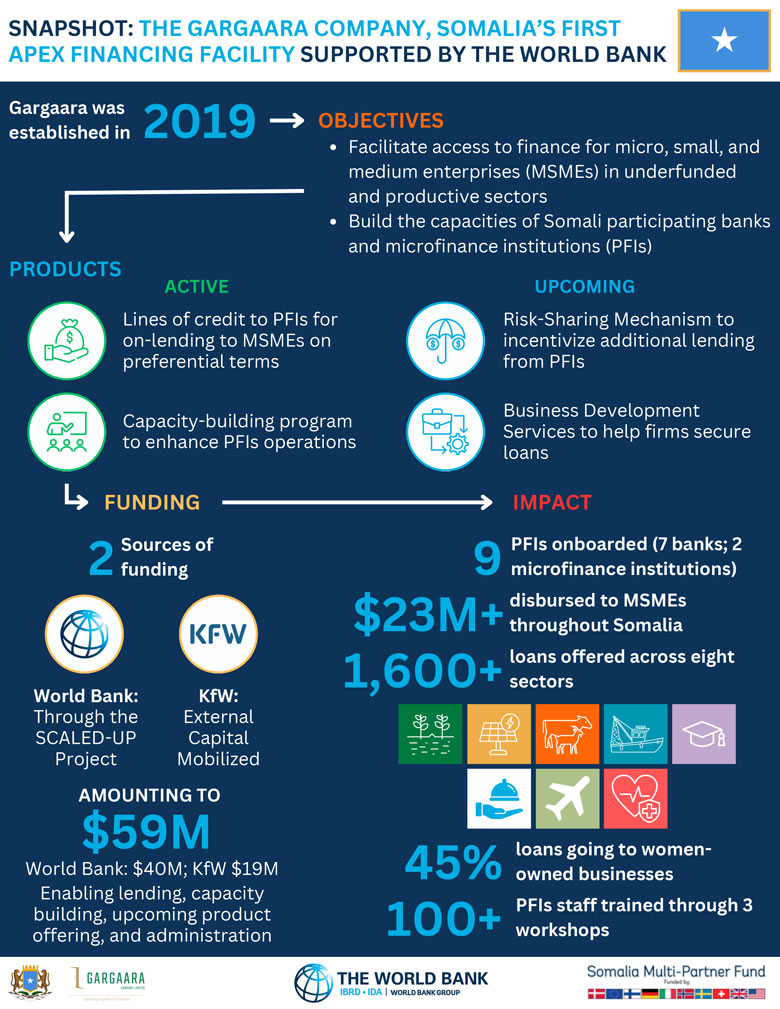When Rima Abdukadir Ahmed built a cold press for grinding sesame seeds into edible oil, she did it the traditional way: with a camel circling a grindstone. Her business, which is established in a busy area of Mogadishu, serves a niche market—one she herself identified—of customers wanting the oil for medicinal use. After a while, she mechanized the press to propel it with car parts (including a transmission, drive shaft, and differential), thus replacing her camel, which required space and fodder.
Used in cooking, sesame oil is tasty and nutritious, and the quality of Rima’s product fetched above market prices. However, to meet demand throughout the year, she needed to offset variations in supplies by increasing the quantity of sesame seed she kept in storage. For this, she needed additional working capital.
Rima contacted a branch of Premier Bank in Mogadishu. Since her business, called Macsarada Salida Khaaluduun (Khaaluduun Sesame Oil), has been operating as part of a value chain since 2016, she benefitted from a strong credibility as a businesswoman, which helped her loan application. The bank approved a two-year loan of $2,200, secured by one guarantor at 8% margin a year, with a four-month grace period to allow Rima to stock up ahead of Somalia’s rainy seasons when sesame harvests drop.
Her repayment capacity was calculated based on market research into camel-powered sesame oil prices, which average $5.5 per liter, setting her repayment obligations at $116 a month in 20 installments. Rima’s new stocks of grain have allowed her to increase output from 150 to 400 liters a month, produce a more consistent supply of oil, and generate enough income to repay her loan, replace machine parts, and pay for repairs.
Access to finance is all too important
In Somalia's challenging financial landscape, accessing capital remains a huge hurdle, particularly for women and men running Micro, Small and Medium Enterprises (MSMEs) in productive sectors such as fisheries, farming, and livestock. These sectors are viewed as high-risk by Somali financial institutions despite their potential to drive job creation and economic growth.
Only 46% of the Somali businesses recently surveyed for the World Bank could access overdraft facilities, with an even lower rate for women-owned businesses, at 21%. The recent World Bank Group Somalia Country Private Sector Diagnostic report also presents access to finance for MSMEs and other businesses in productive sectors as a key challenge in the country.
In 2019, Somalia’s federal government launched an MSME financing facility, the Gargaara Company, to encourage lending to underserved businesses in productive sectors, as well as to MSME businesses developing renewable energy projects. Initially funded with $15 million from the World Bank’s Somalia Capacity Advancement, Livelihoods and Entrepreneurship, through Digital Uplift Project (SCALED-UP, 2019–2025), the facility received an additional $25 million during the COVID-19 pandemic.
The Gargaara Company has established itself as a key player in the Somali financial system for on-lending to MSMEs since 2019, serving as an apex institution that distributes funding through Participating Financing Institutions (PFIs). Today it supports nine PFIs, including seven of Somalia’s 13 commercial banks, plus two microfinance institutions. At an individual level, this means that farmers, fishermen, and pastoralists working in Somalia’s key livestock sector—and other entrepreneurs working on renewables—have been able to access funds more easily to help their enterprises thrive, develop, and expand.
In 2023, Somalia’s Gargaara MSME Financing Facility secured an additional $19 million in funding from German development bank Kreditanstalt für Wiederaufbau (KfW). This new injection of capital has allowed it to increase disbursements and diversify its portfolio to businesses in education, health, hospitality, and small manufacturing.
Scaling up Gargaara’s impact
The overarching aim of SCALED-UP, a $101 million initiative funded by the World Bank's International Development Association and the Somalia Multi-Partner Fund, is to increase access to basic digital financial and government services targeting entrepreneurship and employment, particularly for women. Since its inception in 2019, the Gargaara Financial Facility has issued over 1,600 loans through partner banks and microfinance institutions to determined Somali entrepreneurs like Rima.
However, for most Somali women, the journey toward financial equality is far from over: while women-owned businesses account for nearly half of these loans by number, they represent less than 10% in loan value, out of the more than $23 million lent so far. This disparity underlines the continued need for targeted support.
The effects of these loans are evident in stories like Rima's. With her newfound capital, she has grown her existing operation by looking for new buyers and set her sights on assembling a second grinding mill in a new location. By evaluating her repayment capacity based on cashflow rather than collateral, Premier Bank also discovered the importance of personal contact when connecting with entrepreneurs, especially women.
Looking ahead, Gargaara is set to enlarge its already significant impact on Somalia's financial landscape through a more holistic approach designed to increase credit. At one end, this involves onboarding more Somali financial institutions and scaling up their capacity, particularly to reach women-run MSMEs. At the other, it entails offering new products to MSMEs, such as risk-sharing mechanisms and business development services. As capacities expand at both ends, so does room for more funding and more donors.



